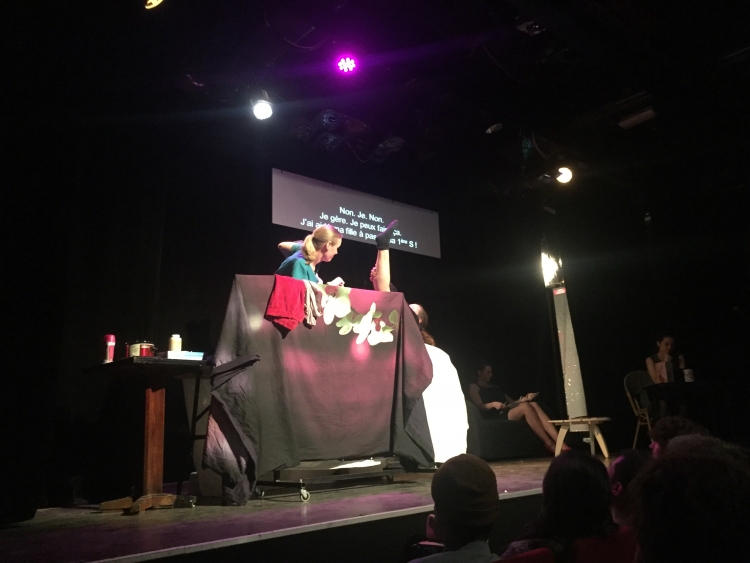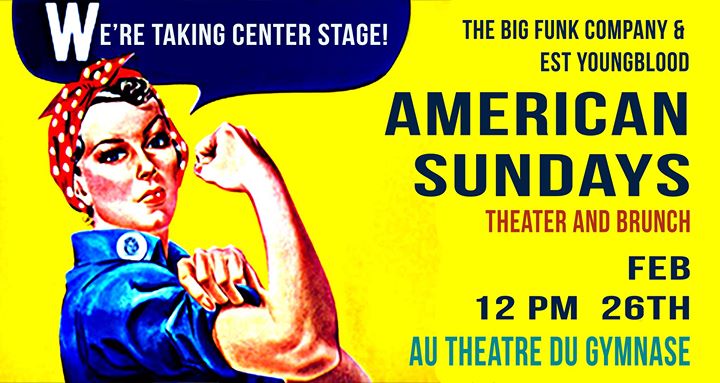Women Take Center Stage?

Anyone involved in the anglophone theater world of Paris is familiar with The Big Funk Company—a bilingual theater organization which focuses on bringing works from American writers into the Parisian community. The company began in 2011, and has created everything from major productions, to workshops and showcases. One of their best-known projects is called American Sundays: a bi-monthly showcase and brunch which, according to Assistant Stage Manager Cordelia Senie, consistently sells out.
After knowing of American Sundays for several months, I was finally motivated to attend this month’s show due to the theme: Women Take Center Stage. As soon as a I saw a flyer with Rosie the Riveter advertising the event, I was incredibly intrigued. Feminism in theater is harder to come by than one might think, so I’m always game for a show which empowers women. Plus, you know, free brunch.
Image Credit: Facebook/The Big Funk Company
As soon as I arrived, I knew that my informant had not been kidding about the popularity of the shows. The line started in the street, and continued down a winding staircase to the underground venue, the Petit Théâtre du Gymnase Marie Bell. The place was packed with people of all ages speaking both French and English, and Taylor Swift and P!nk were playing in the background. Needless to say, it was an exciting atmosphere. I snagged a spot in the front right away, but ended up waiting for around 40 minutes as the theater continued to fill with people. When all the seats were taken, stagehands started running around and bringing in extra chairs. Even then, some people ended up seated on the ground, and I heard the Stage Manager say into his headset, “Yeah, that’s definitely a fire hazard.”
All of this excitement had me eager for the show to start, and I was blown away when the guest musical group DeLaurentis opened the show with an incredibly powerful and moving song called "Glory Box". Unfortunately, that was the most empowering moment for women that would take place on that stage for the rest of the afternoon. The showcase consisted of four short pieces: The Lachrymatory Factor by Clare Barron, Someday We’ll Understand Just How Much by Amanda Keating, Donna’s First Brazilian by Lydia Blaisdell, and Southwest Flight 4007, Atlanta to LaGuardia by Andrew Massey.
The first piece was a bubbly comedy scene about women getting together and cooking with onions—which had been genetically engineered to prevent crying—something that the characters found quite exciting. However, their conversation about the onions eventually changed, and the scene ended with them dissolving into tears about how they know they are “disgustingly exhausting to be around,” with one of the characters even calling herself a “pathetic slug.” Though the acting was phenomenal, the scene left me reeling. No part of me could understand why an event which advertised with a feminist icon would begin with a piece about women in the kitchen, crying and tearing themselves apart.
It didn’t get much better from there, from a feminist point of view. The second scene was about a woman giving birth, who was repeatedly ignored by the male nurse and her brother, and ended up in tears because she was confident that she would ruin the baby’s life. The third was about a woman getting her first Brazilian wax for a date, encouraged by the other women in the spa who say “he’s going to love it”. One of the women even shared that she had her privates bedazzled for her lovers. The final piece was about a flight, with trivial conversation taking place between two passengers, and a female flight attendant making announcements about how she was able to finally quit her job because her spouse had become wealthy.
I cannot express enough how quality the production was. In lighting, set, transitions, costumes, and especially acting, I was blown away. They even had the French translation of the dialogue projected above the stage, for those audience members who might struggle with some of the English. I intend to continue attending the American Sundays shows; but, I have to say, the treatment of the feminist theme left a lot to be desired. I cannot comprehend why they advertised as they did, when the pieces chosen were anything but empowering for women. If they simply meant to emphasize that the cast would be predominantly female, they should have left out any feminist icons in their advertising. But I digress. And, despite the show itself's shortcomings, the brunch was pretty delicious.








